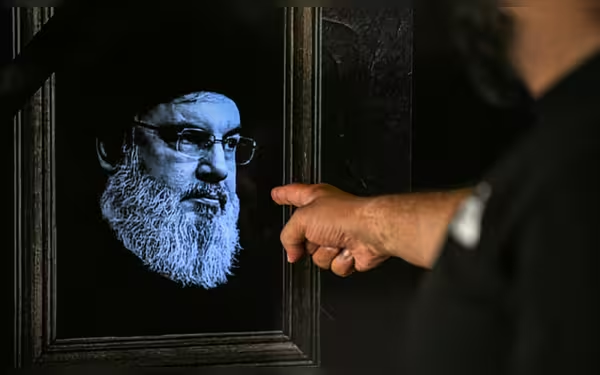Saturday, October 5, 2024 10:28 PM
Hamas Condemns Nasrallah Assassination, Vows to Strengthen Resistance
- Hamas vows to continue struggle after Nasrallah's assassination.
- Hezbollah's leader's death seen as a blow to the Axis of Resistance.
- Humanitarian crisis in Gaza worsens amid ongoing conflict.
 Image Credits: brecorder
Image Credits: brecorderHamas condemns Nasrallah's assassination, asserting it will strengthen resistance against Israeli occupation.
In a significant development in the ongoing conflict between Israel and Palestinian groups, Hamas has expressed its condolences following the reported assassination of Sayyed Hassan Nasrallah, the leader of Lebanon's Hezbollah. This incident, which occurred due to an Israeli airstrike, has raised concerns about the future of the resistance movements in the region. Hamas, a prominent Palestinian organization, stated that Nasrallah's death would only serve to strengthen the resolve of those fighting against Israeli occupation.
Hamas issued a statement emphasizing that the "crimes and assassination by the occupation will only increase the determination and the insistence of the resistance in Palestine and Lebanon." They vowed to continue their struggle with "all their might, bravery, and pride on the footsteps of the martyrs." This declaration highlights the deep-rooted commitment of these groups to their cause, even in the face of significant losses.
The death of Nasrallah is seen as a heavy blow not only to Hezbollah but also to Iran, which has been a key supporter of both Hezbollah and Hamas. The so-called "Axis of Resistance," which includes these groups, has been actively engaged in confrontations with Israel since the outbreak of hostilities on October 7. This conflict was ignited when Hamas launched an attack on southern Israel, resulting in the deaths of 1,200 people and the capture of approximately 250 hostages, according to Israeli sources.
In light of Nasrallah's assassination, Hamas reiterated its solidarity with Hezbollah and the Islamic Resistance in Lebanon. They stated, "We reaffirm our absolute solidarity and standing with the brothers in Hezbollah and the Islamic Resistance in Lebanon, who are taking part in the battle of the Al-Aqsa Flood to defend Al-Aqsa mosque." This statement underscores the interconnectedness of these groups and their shared objectives in the ongoing conflict.
Another Palestinian group, Islamic Jihad, also weighed in on the situation, asserting that "sooner or later, the resistance forces in Lebanon, Palestine, and the region will make the enemy pay the price of its crimes." This sentiment reflects a broader belief among these groups that they will ultimately prevail against Israeli forces.
The humanitarian situation in Gaza remains dire, with a population of 2.3 million people, many of whom have been displaced due to the ongoing violence. According to Gaza health authorities, the conflict has resulted in the deaths of 41,500 individuals, highlighting the severe toll this war has taken on civilians.
As the situation continues to evolve, the implications of Nasrallah's assassination will likely resonate throughout the region. The resilience of the resistance movements, as articulated by Hamas and other groups, suggests that they will not easily be deterred. The ongoing conflict raises critical questions about the future of peace and stability in the region, as well as the humanitarian impact on those caught in the crossfire. Understanding these dynamics is essential for anyone seeking to grasp the complexities of the Israeli-Palestinian conflict and the broader geopolitical landscape.













